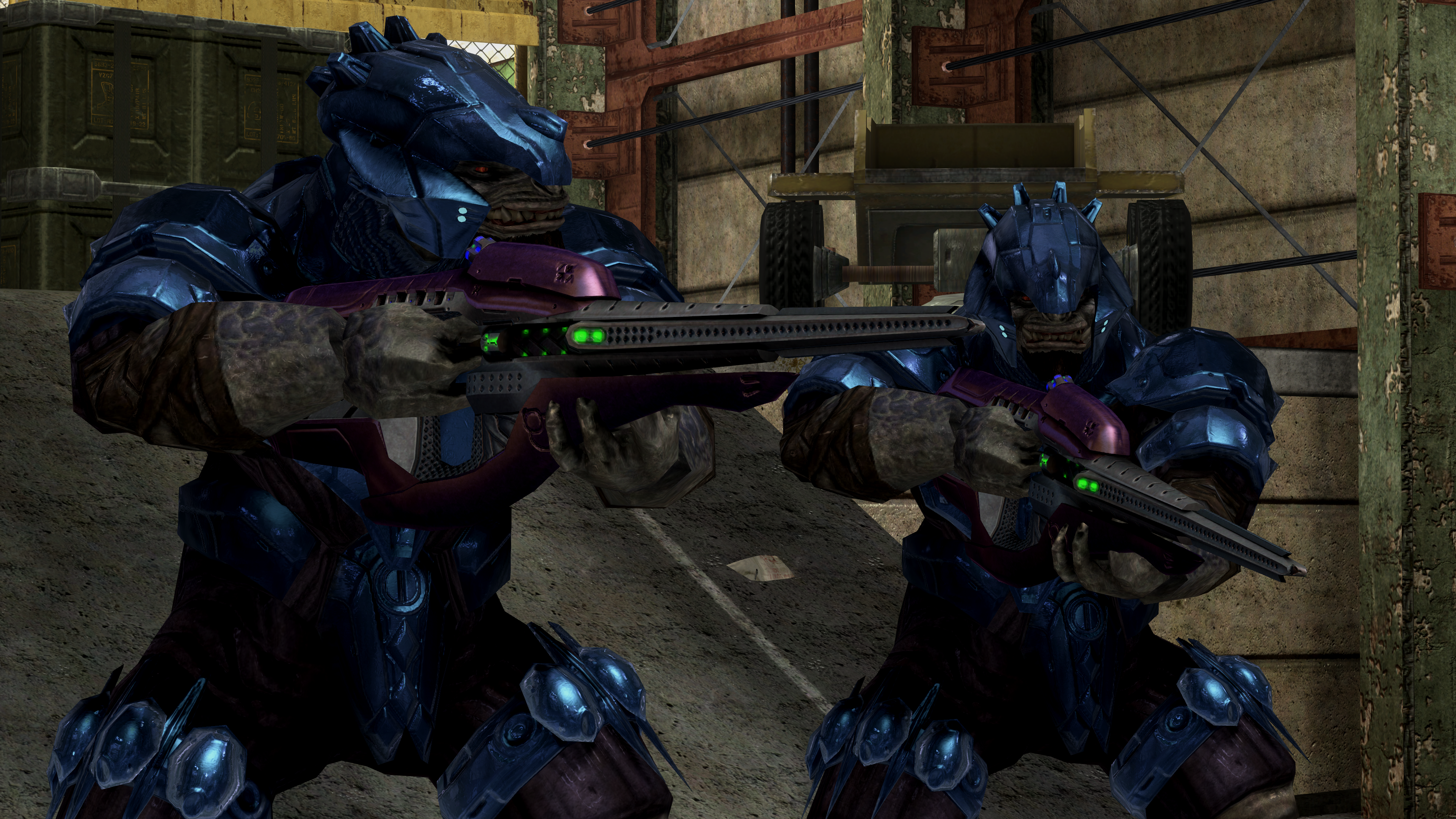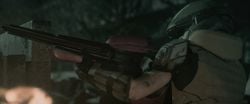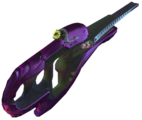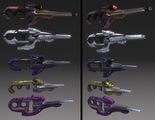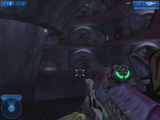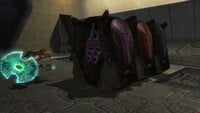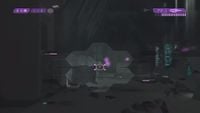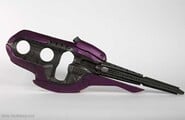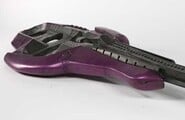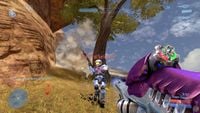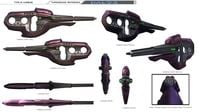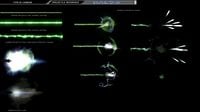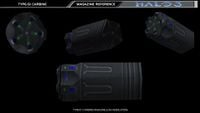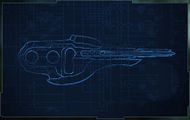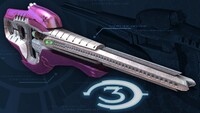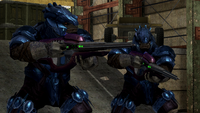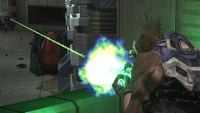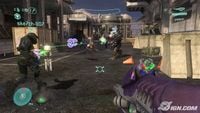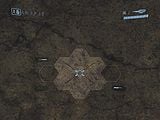Vostu-pattern carbine
From Halopedia, the Halo wiki
| Vostu-pattern carbine | |
|---|---|
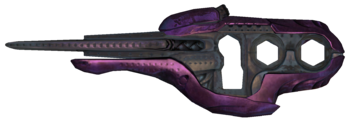 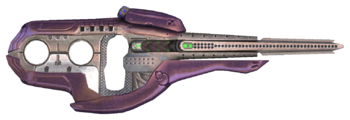
| |
| Production overview | |
|
Manufacturer: |
|
|
Model series: |
Vostu-pattern |
|
Type: |
Carbine |
| Specifications | |
|
Length: |
127.1 centimetres (50.0 in)[1][2]
|
|
Width: |
15.2 centimetres (6.0 in)[4] |
|
Height: |
44.9 centimetres (17.7 in)[4] |
|
Weight: |
|
|
Ammunition type: |
8×60mm caseless radioactive projectiles[2] |
|
Feed system: |
|
|
recoil-operated, charger-fed[3] | |
|
700 m/s (2296 f/s)[3] | |
|
Effective range: |
|
| Service history | |
|
In service: |
|
- "It’s almost a direct analog of the BR55. I just wish it had a more — um — conventional scope."
- — Anonymous serviceman
The Vostu-pattern Carbine,[2] (UNSC Type classification: Type-51 Carbine, T-51 C),[5] and known as the Covenant Carbine, is a midrange weapon that was created by the Sangheili and commonly used by Covenant marksmen.[2]
Overview[edit]
Design details[edit]
Manufactured by Iruiru Armory, the design of the Vostu-pattern carbine has its origins among the Sangheili, with a heritage that stretches back to marksman rifles used in conflicts on Sanghelios millennia ago.[1] Unlike the newer Mosa-pattern carbine, the Vostu-pattern carbine's design was intentionally adapted for use by other species, featuring native link integration. The Vostu-pattern carbine is semi-automatic, recoil-operated and charger-fed. Additionally, it features an optic with 2x magnification. The weapon's cylindrical magazine holds 18 rounds,[1][3][2] and also provides indication of number of rounds left in the magazine by utilizing a holographic display.[1] The back end of the weapon contains two circular openings, the forward one is the weapon's hand guard and the area in front of it is where the weapon's trigger is located. On the weapon's top rail is the magazine well and ammunition chamber,[1] next to it is a hammer like device which springs back when the weapon is fired. The forward part of the weapon contains the Vostu-pattern carbine's barrel, which controls the rapid acceleration of the projectile out at a high velocity.[3]
Ammunition[edit]
The Vostu-pattern carbine marks itself as unique among Covenant firearms by its ammunition. Rather than using plasma, which can be inaccurate, noisy, and slow at long range,[5] this weapon utilizes 8×60mm caseless radioactive projectiles. This ammunition can come in a number of compositions, but the Covenant primarily employ an extremely toxic compound mined from a radioactive moon in the Sangheili's home star system,[1] as well as several other locations in Covenant territory.[6] The Vostu-pattern carbine can fire this ammunition at supersonic speeds,[5] accelerated to anywhere from Mach 1 to Mach 5 and traveling downrange at 2,296 feet per second.[1] The projectile, coated in a shielded material,[1] is powered along its entire flight path, consuming up to 50% of its total mass by the time it reaches its maximum effective range[3] and can stop a target at up to six hundred and fifty yards. It is believed that this round is based on technology used in the larger fuel rod weapons.[5]
Against lightly armored targets, the projectile's supersonic speed and super-heated nature ensure armor penetration on either the first or second impact. Impacts to the flesh can vary depending upon range and speed - a single round impacting flesh at close range will penetrate deep into the target and can nick bone. The kinetic energy from the impact of a round at close range can knock back an individual.[7] Two rounds that impact the same area at close range will pass through the target easily. Upon impact, the round releases a toxic material into a victim's bloodstream,[1] in addition to radiation burns the victim suffers. The chance of survival from being hit by the Vostu-pattern carbine is low - if the round has not struck a vital organ, the victim still has only a few minutes before the toxic chemicals kill them unless treated immediately.[1]
Usage[edit]
The Vostu-pattern carbine served as one of the Covenant's primary medium to long-range weapons. It was frequently used by Sangheili of various ranks, though its most prominent use is among Kig-yar marksmen, scouts, and trackers, who often utilized the weapon as an effective tool for sharpshooting and assassination.[5] After the Great Schism, Jiralhanae infantry were often deployed with this weapon.[8] Though it was encountered as early as 2526,[9] and was seen occasionally during the Human-Covenant War,[10] it was not properly cataloged by the Office of Naval Intelligence until 2551.[Note 1]
UNSC remarks[edit]
- “So — it’s just their projectile weapons that we’ve figured out how to reload? I guess I’m cool with that.”
- “It’s almost a direct analog of the BR55. I just wish it had a more — um — conventional scope.”
- “In my youth I used to board Olympus a couple o’ times a year—you see where I’m going with this? Yeah. That foxtrot gun is the size of my old board.”
- “Oh man! You really need to learn to recognize the symbols on top of the charger—and count your shots, too. First time I picked one up I just about brained myself when it ejected.”
- “Wish it was smaller; wish it had a proper stock—or at least a butt pad.”
- "Hey — don’t inhale immediately after the charger ejects. I heard that shit will give you Boren’s Syndrome."[Note 2]
Non-canon and dubious canon appearances[edit]
Silver Timeline[edit]
- Main article: Silver Timeline
Vostu-pattern carbines are used by Covenant against humanity. One model was held in a display case in Dr. Keyes' lab.
Gameplay[edit]
Advantages[edit]
The Vostu-pattern carbine, with its 2× zoom ability is an excellent medium-ranged weapon; its accuracy and performance in the field makes it a popular choice for infantry who are required to engage enemy infantry:
- The Carbine can kill a standard-shielded enemy in seven rounds.
- The Carbine's rate of fire is faster than any known mid-long range semi-automatic weapons of its class.
- The Carbine can disable any type of infantry energy shield system including Jiralhanae power armor, Kig-Yar point defense gauntlets or Covenant portable shields.
- The Carbine's relative precision and low noise emission allows the carbine to perform multiple roles in the field; including designated marksman.
Disadvantages[edit]
The ballistic round gives off a light green trail, exposing the shooter's position, a weakness similar to the Sulok-pattern beam rifle. Its distinct sound at close to medium range may also attract the attention of nearby enemies. The Vostu-pattern carbine's firepower, when compared with its UNSC counterpart, the Battle Rifle, is stronger, yet slightly less accurate, especially if fired too fast. The magazine is also relatively small and when faced with shielded enemies, the player usually requires an entire clip to eliminate the target unless they aims at weak spots on the armor or energy shield systems.
Changes between games[edit]
Changes from Halo 2 to Halo 3[edit]
- In Halo 2, when the players uses the scope, the view is a group of seven hexagons melded into a honeycomb shape. In Halo 3, four lines will separate from the center in addition to the hexagons, almost on the same plane as the reticle lines.
- In Halo 3, the Carbine has a green patterned circle on top of the magazine indicator.
- Carbine ammo is much more abundant, double the amount usually given in Halo 2.
- Improved design, including more polygons and better textures.
- New sound effects for the carbine.
- The power has been reduced slightly from its Halo 2 counterpart. It now takes 8 shots to kill a fully-shielded opponent in multiplayer, presuming the last shot is to the head, as opposed to 7 shots in Halo 2.
- In addition to the reduction in per-shot damage, the Carbine also starts with two spare magazines when found in multiplayer, whereas it only started with a single spare magazine in Halo 2 multiplayer.
- Emits a small cloud of green gas and a soft hissing noise when reloading.
Trivia[edit]
- In the Halo 2 and Halo 3 instruction booklets, the Carbine is incorrectly labeled as having 36 rounds, instead of the actual 18 rounds. This is actually the number of rounds the Carbine's human equivalent, the Battle Rifle, has.
- In Halo 2, on the level Sacred Icon, there is a glitch where the player starts off with 78 spare rounds instead of the usual 72. However, if the player empties the magazine and then try and pick up Carbine ammo, the player will only be able to get a total of the usual 72 spare rounds.
- A number of Covenant Carbines have more spare ammo than normally allowed on the Halo 2 level Sacred Icon.
- On the Halo 2 campaign level Gravemind, several Carbines have 120 rounds in reserve, much more than the usual max, 72. This also occurs on other levels, especially if the Carbine is taken from an ally scripted to pick the weapon up, such as the Marines in the detention block in Gravemind.
- If the player gives a shield-bearing Jackal a Carbine in Halo 2 and then melee it, it will drop the Carbine and pull out a Plasma Pistol. This is done for the Unlimited Plasma Pistol Glitch.
- In Halo 2, when reloaded, the Covenant Carbine's magazine will pop out but disappear almost immediately. In Halo 3 they will fall on the floor and take a short while to disappear.
- In the Halo Wars official strategy guide, the Covenant Carbine is called a "slug beam rifle", probably because it fires radioactive rounds at rather high velocities and at long ranges.
- The designer's idea of the Vostu-pattern carbine self-ejecting the spent magazine might have come from the WWII-era M1 Garand's en-bloc clip.
- In Halo 3: ODST, the Carbine has a different firing sound, sounding much deeper than before. Also in Halo 3: ODST, if fired long enough, like the rest of the weapons, the reticle will start moving up. This is likely the result of the player character being an Orbital Drop Shock Trooper, instead of a SPARTAN-II or Sangheili.
- The Carbine is arguably the best non-power weapon available in ODST's Firefight mode. This is due to both the removal of the Battle Rifle from the game and the Carbine's status as a headshot-capable energy weapon, which makes its rounds immune to the adverse effects of the Tilt Skull.
- The Carbine seen in Halo 4: Forward Unto Dawn appears to be the Halo 3 iteration of the weapon, rather than the Halo 4 version. This is likely because it is probably the same prop that WETA Workshop created for Halo: Landfall.
- It is unknown why the Vostu-pattern carbine is designated as a carbine despite its length being greater than most Covenant "rifles" and its use as a marksman weapon.
Gallery[edit]

|
Browse more images in this article's gallery page. |
Developmental images[edit]
An early render of the Covenant Carbine for Halo 2.
Carbine variants, as they were intended to appear in the cancelled Halo MMO.
Halo 2[edit]
Halo 3[edit]
A photo of the carbine prop built by WETA Workshop for Halo: Landfall.
A player attacks a Spartan with a carbine in the Halo 3 Beta.
Other[edit]
Kai-125 using a carbine in Halo: The Television Series Season Two.
List of appearances[edit]
- Halo 2 (First appearance)
- Halo: Uprising
- Halo 3
- Halo Wars
- Halo: Helljumper
- Halo 3: ODST
- Halo Legends
- Halo: Evolutions - Essential Tales of the Halo Universe
- Halo: Blood Line
- Halo: Combat Evolved Anniversary
- Halo 4: Forward Unto Dawn
- Halo: Broken Circle
- Halo: Silent Storm
- Halo: Shadows of Reach
- Halo: The Television Series Season One
- Halo: The Television Series Season Two
- Halo: Empty Throne
Notes[edit]
- ^ The Halo Encyclopedia (2022 edition) indicates that the Halo 4 and Halo 2: Anniversary carbine is a Mosa-pattern carbine, despite the UNSC designating it as a Type-51 carbine like the Vostu-pattern. However, this can be attributed to the UNSC's different classification standards when compared to the Covenant's.
- ^ There are no conclusive tests that indicate that the Vostu-pattern carbine puts the user at risk for contracting Boren's syndrome.
Sources[edit]
- ^ Jump up to: a b c d e f g h i j k l Halo: The Essential Visual Guide, page 38
- ^ Jump up to: a b c d e f g Halo Encyclopedia (2022 edition), page 292
- ^ Jump up to: a b c d e f g h i j Bungie.net, Type-51 Carbine (Retrieved on Jan 16, 2021) [local archive] [external archive]
- ^ Jump up to: a b Halo 4: The Essential Visual Guide, page 38
- ^ Jump up to: a b c d e Halo Encyclopedia (2011 edition), page 322
- ^ Halo Waypoint, Catalog Interaction - Page 48 (Retrieved on Oct 12, 2014) [archive]
- ^ Halo: Evolutions - Midnight in the Heart of Midlothian
- ^ Halo 3, campaign level Crow's Nest
- ^ Halo 4: Forward Unto Dawn
- ^ Halo Wars
| ||

